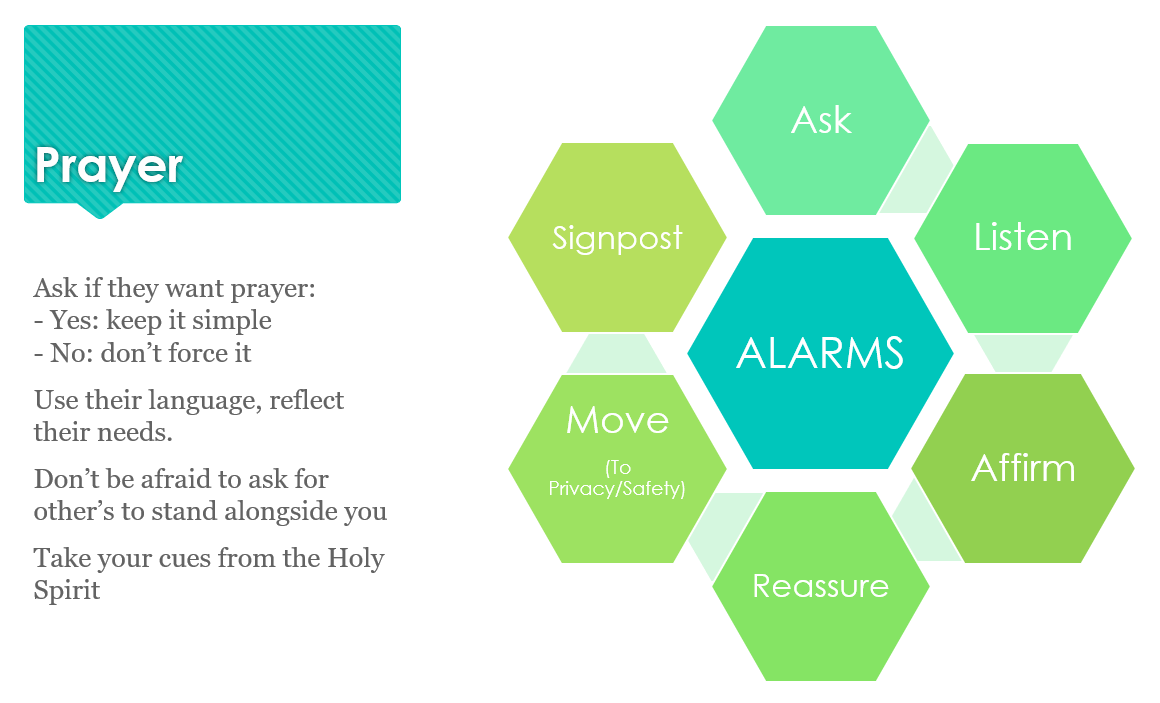Prayer is big part of our belief and practice as Christians. Throughout the Bible we see the importance of praying in all things, praying in secret, praying in groups, prayer as worship. We are reminded to pray boldly, to pray that God's Kingdom come and His will be done, to ask for His Holy Spirit to be with us. We are shown time and time again the miracles that come when we pray and the power it has in our lives. However, we can be wary of praying for mental health difficulties - what are we actually praying for, is this what they need, is it mental health or spiritual affliction? I pray that the information below will help you know when and how to pray, and be encouraged to step out.
When
Hopefully, you're wondering whether to pray because you're having a conversation with someone where they share some difficulties, or you have recognised symptoms of a mental health difficulty. It may be that they have come forward for ministry time or have put in a request during prayer and share time in a smaller group setting.
As we are told throughout the New Testament - pray continually. If you have the opportunity to pray there and then, do it. If you can't pray with them, then pray for them, for we are called to intercede on behalf of others.
How
The how can be the more challenging part for many when it comes to pray.
I don't know what to pray for?
Is mental health something that can be healed?
What if prayer doesn't change anything?
Compared to healing for a physical problem, or a change in a specific circumstance, we can worry about saying the right or wrong thing with mental health.

The first step is ASK
Do they want prayer in the first instance?
No - Not everyone will want prayer for different reasons, and that is OK. Some people may have had bad experiences in the past or think it won't make a difference. We can pray for them at home, and there is still power in this. You can still see if they are open to support or know where to get support if needed (e.g. GP or websites like MIND or Rethink).
Yes - Great! The next step is to Keep it Simple.
Hopefully you will have listened to what they are going through, so reflect that back to them. Use their language. Sometimes we can jump in with a healing prayer and that may not be what they want. Mental Health is not going to be healed in the same way as a knee or headache, and some many not see it as something they need healing from, so using their words stops us from praying what we think they need.
If in doubt, just start by asking the Holy Spirit to Come.
We can do nothing without the Spirit and God knows us inside out, so we should ask His Presence to be with us. Sometimes breakthrough happens because we left space for God do His thing. Then follow His lead - you may feel like you have a word or a picture for the individual, or you may notice a manifestation that could mean change is happening.
Make sure that they are still signposted to support at the end of prayer. That may just be calling them in the week to see how they are doing or referring them to their GP or specialist websites. Maintaining positive well-being and mental health is a process that requires more than prayer, so it's important that we know where to get help when needed.
So to summarise:
Ask if they want prayer.
- No - that's OK, but see if they would be open to support.
- Yes - great!
Keep it Simple and use their language - you don't have to talk the whole time.
Ask for the Holy Spirit to Come; without Him nothing can happen.
See what's happening and follow any cues from the Spirit.
Signpost to support where possible.
